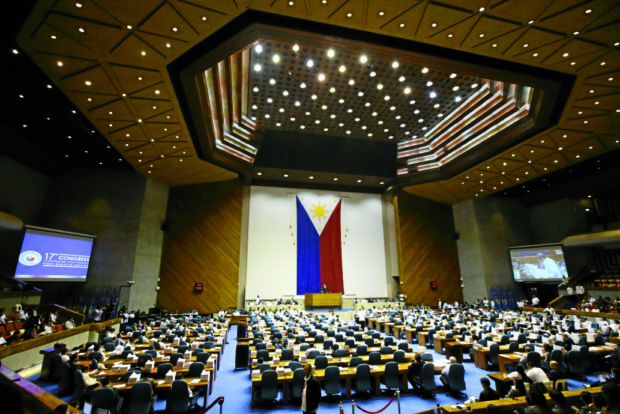House passes Duterte’s tax reform package on final reading

AP Photo/Aaron Favila
The House of Representatives passed on third and final reading President Rodrigo Duterte’s comprehensive tax reform package before the 17th Congress adjourned its first regular session on Wednesday.
The House voted 246 for and 9 against to pass House Bill 5636, also known as the Tax Reform for Acceleration and Inclusion (TRAIN).
Opposition lawmaker Albay Rep. Edcel Lagman was the lone abstention to the bill.
Lawmakers who voted against the bill, majority of whom are from the militant Makabayan bloc, emphasized that the tax measure was anti-poor because while it did lower personal income taxes, the public would shoulder the increase in prices of basic goods and services as a result of additional taxes on fuel and sugar-sweetened beverages, among others.
The most attractive feature of the TRAIN is the lower tax rate for fixed income earners starting Jan. 1, 2018.
Government will no longer impose tax personal income not over P250,000. Incremental tax will be imposed on personal income over P250,000.
The House retained the 12-percent value added tax (VAT) exemption for cooperatives, following strong opposition to its repeal. The VAT would be imposed on electric cooperatives because they are among those considered to provide “sale or exchange of services” for a fee, remuneration, or consideration.
However, the bill removed the VAT exemption on the lease of residential units with a monthly rental not exceeding P10,000.
VAT-exempt are power or fuel generated through renewable sources of energy such as but not limited to biomass, solar, wind, hydropower, geothermal, ocean energy, and other emerging energy sources using technologies such as fuel cells and hydrogen fuels.
Automobiles willl be levied incremental taxes effective Jan. 1 next year.
The controversial excise tax on petroleum products was retained despite strong opposition from various quarters.
Effective Jan. 1 next year, there would be a P7 tax on leaded and unleaded premium gasoline; P3 for kerosene; P3 for diesel fuel oil; P3 for liquefied petroleum gas; and P3 per kilogram of asphalts, among others.
By 2019, tax on leaded and unleaded premium gasoline would be P9; P5 for kerosene; P5 for diesel fuel oil; P5 for liquefied petroleum gas; and P5 per kilogram of asphalts.
By 2020, tax on leaded and unleaded premium gasoline would be P10; P6 for kerosene; P6 for diesel fuel oil; P6 for liquefied petroleum gas; and P6s per kilogram of asphalts.
An excise tax of P10 would be imposed on sugar sweetened beverages, which include sweetened juice drinks, sweetened tea and coffee, carbonated beverages with added sugar, including those with caloric and non-caloric sweeteners, flavored water, energy drinks, sports drinks, powdered drinks, cereal and grain beverages, and other non-alcoholic beverages that contain added sugar.
Caloric and artificial sweeteners will also be imposed the P10 tax.
Excluded from this tax are plain milk and milk drinks without added sugar, infant formula and milk alternatives such as soy milk, almond milk, and flavored milk; one hundred percent fruit and natural vegetable juices; and meal replacements and medically indicated beverages.
To cushion the impact of the additional and new taxes, the bill provides for a social benefits program where beneficiaries will be given a social benefits card.
For four years, 40 percent of the yearly incremental revenues generated from the petroleum excise tax would be allocated for this social fund.
The poorest 50 percent of the population may receive targeted cash transfers, discounts on public utility vehicles, fares, and medicines, subsidies on food and housing and other social protection measures.
Revenues from the tax reform package will be allocated to infrastructure, health, education, housing, and social protection expenditures.
Infrastructure allocation would be prioritized to address congestion through mass transport and new road network, the bill said.
Revenue from the VAT imposition on sale of real property would be utilized for the government’s socialized housing programs.
The revenue from the sugar sweetened beverages taxes would go to a health promotion fund. /atm